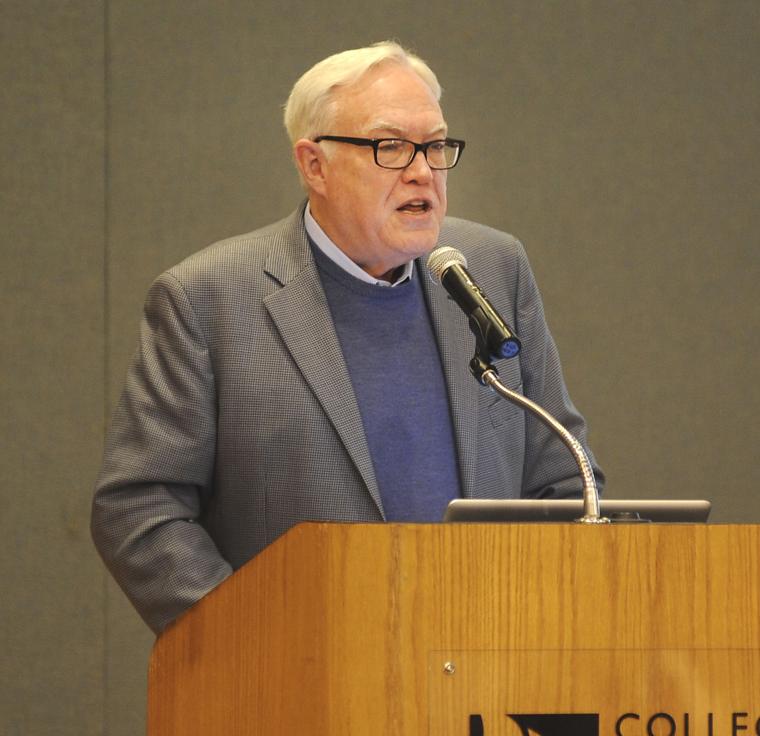CCGA host 2nd annual literacy forum
By ANNA HALL The Brunswick News

The College of Coastal Georgia hosted the second annual Literacy Forum Friday. Keynote speaker Michael McKenna, a professor at the University of Virginia who authored “Bookworms: The When, Where, Why and How of a Free and Effective Core Program,” spoke to education students at the college, as well as to educators and administrators from the region about effective methods for teaching and improving literacy in students. The day-long forum featured McKenna as well as an afternoon of break-out sessions to further promote accessible literacy-based teaching models.
Regional educators and local college students stepped out of their respective classrooms Friday to come together for a less traditional learning experience.
In its second year, the College of Coastal Georgia Literacy Forum drew educators from as far away as Pierce and Butts counties, as well as education students from the college and local residents, to hear teaching methods and improved literacy models from keynote speaker Michael McKenna, a professor at the University of Virginia who penned the book, “Bookworms: The When, Where, Why, and How of a Free and Effective Core Program.”
Ron Reigner, College of Coastal Georgia education professor and coordinator of the event, said McKenna is most known by classroom teachers as co-inventor of the widely used twenty-question Elementary Reading Attitude Survey, known as the “Garfield Reading Survey.”
“It uses pictures of Garfield the Cat to ascertain children’s attitudes toward both recreational reading and academic reading through sixth grade,” Reigner said.
He said McKenna’s follow-up research demonstrated that the self-reported attitudes of children toward reading lessen each year as they move from grades one to six.
“But many of us are fighting the good fight to keep this trend at bay as much as possible,” Reigner said. “(McKenna) is a very big influence in the education world.”
Sitting attentively in the audience as McKenna demonstrated teaching and literacy tactics to experienced teachers and education students, college sophomore and education major Courtney Kilpatrick took notes. About 30 minutes into McKenna’s 90-plus minute talk, Kilpatrick noted that she had already learned a great deal about the business of academics in which she would be entering in the coming years.
Particularly, she said, McKenna’s demonstration of the so-called literacy staircase model, which details the step-up model of education and the support needed in the classroom to improve literacy rates, had left a definite mark on her mindset.
“It’s been a really great morning so far,” Kilpatrick said. “I definitely am taking away a lot of great information.”
That was the goal, Reigner said, and he was satisfied it had been met effectively.
For Deborah Smith, a College of Coastal Georgia education professor, the day-long forum, which included afternoon break-out sessions, was a chance to add pieces to the daily classroom puzzle.
Every new skill learned, every new idea sparked, is one more tool educators can use to effectively teach literacy to a wide range of students.
“This forum just gives them one more chance to find that ‘ah-hah’ moment, to see how they can address a certain student or a certain situation,” Smith said. “It sounds cliche, but the more you know, the more you have to work with. Opportunities like this forum just add extra umph to a teacher or to-be teacher’s talents and efforts.”
Other educators felt the forum was worth the drive and the hours of lessons.
Some 150 registered for the event, surpassing the 125 who attended last year.
“We hope to do it again next year, too,” Reigner said. “This area of our state is doing many wonderful things in terms of literacy education throughout the community. Between the public libraries, along with their Friends groups, and the schools, not to mention organizations such as the local newspaper, the Community Foundation, the Glynn County Ferst Foundation for childhood literacy, and many others, literacy is front and center in the public’s minds.
“Literacy and education are essentials of any community and they are appreciated here. Any additional effort we can push out there, like this forum, is always valuable.”